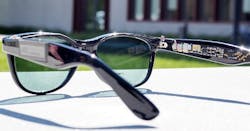Glasses with semitransparent organic photovoltaic coating generate solar power
Researchers from the Karlsruhe Institute of Technology (KIT; Karlsruhe, Germany) have created sunglasses with colored, semitransparent organic solar cells applied onto the lenses that supply a microprocessor and two displays integrated into the eyeglasses with electric power. The same technology could also be used with architectural windows to provide both power and a view.1
The photovoltaic glasses, designed as a case study by Alexander Colsmann, Head of the Organic Photovoltaics Group at KIT's Light Technology Institute (LTI), and his team, is self-powered and provides measurements and a display of the solar illumination intensity and ambient temperature. The solar cell lenses, perfectly fitted to a commercial frame, have a thickness of about 1.6 mm and weigh about six grams, about the same as the lenses of traditional sunglasses.
The microprocessor and the two small displays, which are integrated into the temples of the solar glasses, show the illumination intensity and the ambient temperature in the displayas bar graphs. The glasses also work in indoor environments under illumination down to 500 Lux, which is the usual illumination of an office or a living area. Under these conditions, each of the "smart" lenses still generates 200 μW of electric power, which is enough to operate devices such as a hearing aid or a step counter.
According to Colsmann, another field of application is the integration of solar cells into buildings: Since the glass facades of high-rise buildings must often be shaded, it is an obvious option to use organic solar modules for transforming the absorbed light into electric power. A future vision for the engineer is to coat large surfaces with organic solar cells using reel-to-reel technology.
Source: https://www.kit.edu/kit/english/pi_2017_093_solar-glasses-generate-solar-power.php
REFERENCE:
1. Dominik Landerer et al., Energy Technology (2017); http://onlinelibrary.wiley.com/doi/10.1002/ente.201700226/abstract

John Wallace | Senior Technical Editor (1998-2022)
John Wallace was with Laser Focus World for nearly 25 years, retiring in late June 2022. He obtained a bachelor's degree in mechanical engineering and physics at Rutgers University and a master's in optical engineering at the University of Rochester. Before becoming an editor, John worked as an engineer at RCA, Exxon, Eastman Kodak, and GCA Corporation.
